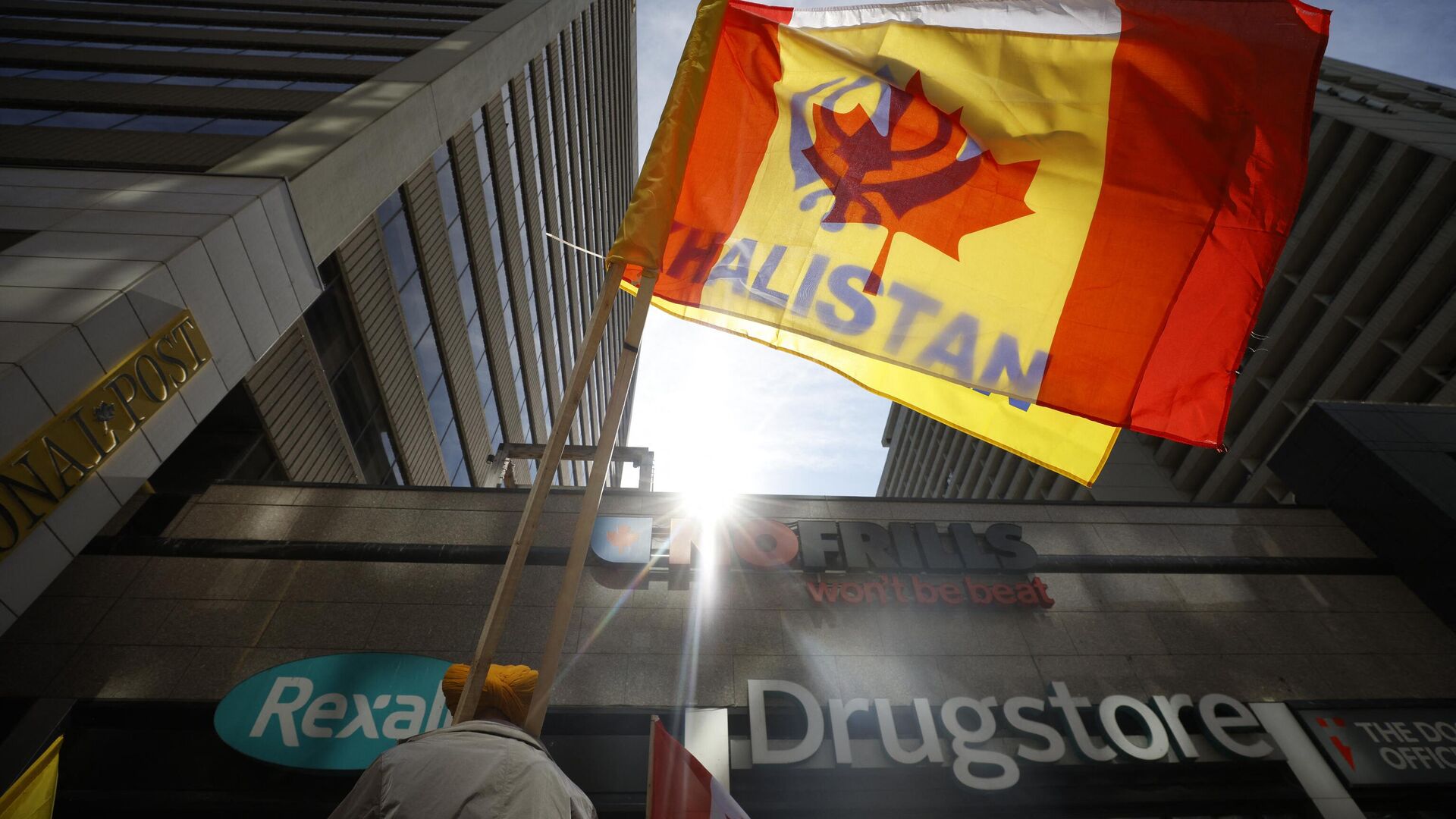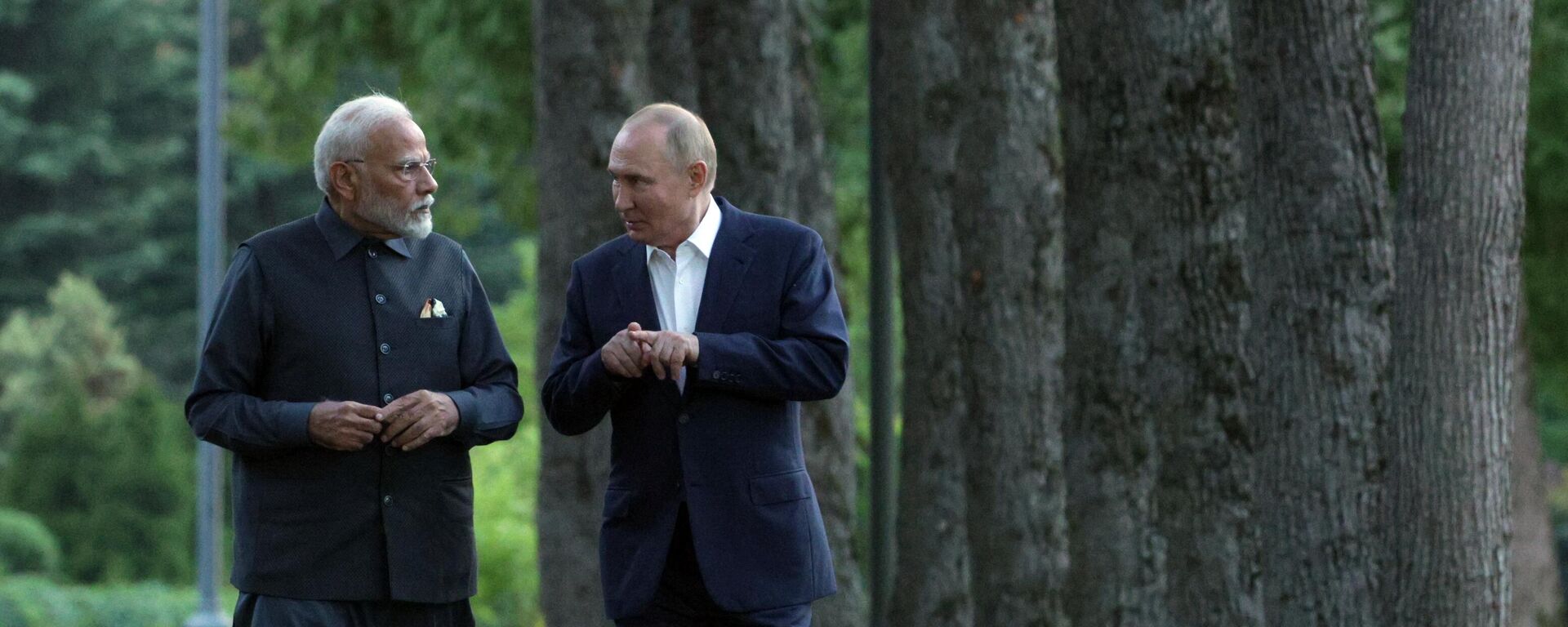https://sputniknews.in/20241017/west-emboldening-khalistanis-as-part-of-proxy-war-against-india-opinion-8281082.html
West Emboldening Khalistanis as Part of Proxy War Against India: Opinion
West Emboldening Khalistanis as Part of Proxy War Against India: Opinion
Sputnik India
A former Indian intelligence officer told Sputnik India that both the Khalistan issue and the Ukraine conflict should be seen as part of America's overarching global policy of waging "proxy wars" against partners and adversaries alike, in order to achieve US strategic goals to maintain hegemony.
2024-10-17T20:17+0530
2024-10-17T20:17+0530
2024-10-17T21:24+0530
sputnik opinion
canada
khalistan movement
us
us hegemony
india-pakistan war of 1971
ukraine
russia
pakistan
terrorism
https://cdn1.img.sputniknews.in/img/07e8/02/08/6487277_0:161:3070:1888_1920x0_80_0_0_6d959a91e043d087616ed17a8b29b100.jpg
The Anglo-Saxon countries, particularly the US and Canada, have been emboldening and shielding the pro-Khalistan – anti-India extremists – as part of their "proxy war" against India, Colonel RSN Singh, a retired officer of India's spy agency Research and Analysis Wing (R&AW) told Sputnik India.However, there's a major difference on how the Ukraine and the Khalistan issue have evolved over the years, he said. It was crystal clear that the US and Canada were using Sikh extremists, which have become politically significant in both countries, as "proxies" and "strategic weapons" to pressure India to toe with their foreign policy, Singh stressed. He called Canada and other Five Eyes Alliance (FVEY) partners "lackeys" of the US, while dwelling on the Khalistan issue against the backdrop of the recent India-Canada diplomatic fracas.The US started to wield the Khalistan movement against India in the aftermath of the strategic defeat inflicted in the 1971 Bangladesh War of Liberation, he recalled."Smarting under the defeat to its then ally Pakistan, the Western countries started to allow training of pro-Khalistan groups on western soil as well as facilitated them. In this project, the West got a willing partner in Pakistan. Our agencies have enough evidence on record to point to the West-ISI nexus on training and abetting Khalistan terrorism against India," Singh stated.He pointed out the recent comment by the Canadian Security Intelligence Service (CSIS) at the Foreign Interference Commission hearing confirms Pakistan's direct support to Khalistani extremism to reduce India's influence.In India's neighbourhood, the US has had a decades-long track record of cultivating jihadists, the roots of which could be traced to the Moscow-Afghanistan War in the 1980s, Singh highlighted, adding that the western allies were still arguably deploying radical Islamists as proxies in the region.A decisive turn in the evolving Khalistan movement from the 1970s to the present day occurred after Operation Blue Star in 1984 and the subsequent assassination of then Prime Minister Indira Gandhi by her own bodyguards, Singh said.He went on to highlight a foiled assassination plot against India's former Prime Minister Rajiv Gandhi during a curtailed visit to the US in 1985, noting that the suspect, Lal Singh of the International Sikh Youth Federation (ISYF), had been trained in arms and explosives handling by the FBI.Even Hardeep Singh Nijjar (gunned down by unidentified men last June), a designated terrorist who migrated to Canada from India in 1996, was given a free hand to incite calls to violence against India, he stressed.Since 2003, India has presented over 20 detailed dossiers about Nijjar and other criminal and terrorist entities in Canada. However, as New Delhi has stated on several occasions, there is no or little action taken against them by the Canadian authorities.Pro-Khalistan radicals have become an influential political constituency in Canada, and to some extent in the US and the UK as well, Singh stated.Singh suggested that certain American and Canadian organisations were allegedly involved in supporting the pro-Khalistan movement in Punjab. The groups backed by the US Baptist Church facilitated conversions in collaboration with pro-Khalistan factions, he said, indicating that the Church helped pro-Khalistan radicals migrate to the West in exchange for assistance in expanding its presence in Punjab. The current missionary activities there is viewed as a direct consequence of this tacit agreement, the veteran stated.Canada's support of pro-Khalistan extremists could "backfire" on the Trudeau government, Boris Volkhonsky, Associate Professor at the Institute of Asian and African Countries, Moscow State University, told Sputnik India, commenting on the India-Canada row.Separatism in India hadn't been completely eradicated as of today, Volkhonsky cautioned.The expert accused the Western countries of following a "carrot-and-stick" approach towards India. The Canadian government didn't want to "upset" the powerful pro-Khalistan lobby, which was exterting pressure on the Liberal Party to take a tough line against New Delhi, Volkhonsky reckoned.
https://sputniknews.in/20241016/russia-understands-indias-concerns-on-khalistan-issue-expert-8279816.html
canada
us
ukraine
russia
pakistan
punjab
south asia
Sputnik India
feedback.hindi@sputniknews.com
+74956456601
MIA „Rossiya Segodnya“
2024
Dhairya Maheshwari
https://cdn1.img.sputniknews.in/img/07e6/0c/13/138962_0:0:641:640_100x100_80_0_0_2cb44360dbcdf6d84bf4b299cd045917.jpg
Dhairya Maheshwari
https://cdn1.img.sputniknews.in/img/07e6/0c/13/138962_0:0:641:640_100x100_80_0_0_2cb44360dbcdf6d84bf4b299cd045917.jpg
News
en_IN
Sputnik India
feedback.hindi@sputniknews.com
+74956456601
MIA „Rossiya Segodnya“
Sputnik India
feedback.hindi@sputniknews.com
+74956456601
MIA „Rossiya Segodnya“
Dhairya Maheshwari
https://cdn1.img.sputniknews.in/img/07e6/0c/13/138962_0:0:641:640_100x100_80_0_0_2cb44360dbcdf6d84bf4b299cd045917.jpg
canada, khalistan movement, us, us hegemony, india-pakistan war of 1971, ukraine, russia, pakistan, terrorism, cross-border terrorism, counter-terrorism, terrorist attack, territorial integrity, terror outfits, punjab, south asia
canada, khalistan movement, us, us hegemony, india-pakistan war of 1971, ukraine, russia, pakistan, terrorism, cross-border terrorism, counter-terrorism, terrorist attack, territorial integrity, terror outfits, punjab, south asia
West Emboldening Khalistanis as Part of Proxy War Against India: Opinion
20:17 17.10.2024 (Updated: 21:24 17.10.2024) Both the Khalistan issue and the Ukraine conflict are part of America's broader strategy of waging "proxy wars" to maintain global hegemony, a former Indian intelligence officer told Sputnik India.
The Anglo-Saxon countries, particularly the US and Canada, have been emboldening and shielding the pro-Khalistan – anti-India extremists – as part of their "proxy war" against India, Colonel RSN Singh, a retired officer of India's spy agency Research and Analysis Wing (R&AW) told Sputnik India.
"This is an era of proxy wars. What is happening in Ukraine is essentially an American proxy war against Russia," Singh stated.
However, there's a major difference on how the Ukraine and the Khalistan issue have evolved over the years, he said. It was crystal clear that the
US and Canada were
using Sikh extremists, which have become politically significant in both countries, as
"proxies" and "strategic weapons" to pressure India to toe with their foreign policy, Singh stressed. He called Canada and other Five Eyes Alliance (FVEY) partners
"lackeys" of the US, while dwelling on the Khalistan issue against the backdrop of the recent
India-Canada diplomatic fracas.
The US started to wield the Khalistan movement against India in the aftermath of the strategic defeat inflicted in the 1971 Bangladesh War of Liberation, he recalled.
"Smarting under the defeat to its then ally Pakistan, the Western countries started to allow training of pro-Khalistan groups on western soil as well as facilitated them. In this project, the West got a willing partner in Pakistan. Our agencies have enough evidence on record to point to the West-ISI nexus on training and abetting Khalistan terrorism against India," Singh stated.
He pointed out the recent comment by the Canadian Security Intelligence Service (CSIS) at the Foreign Interference Commission hearing confirms Pakistan's direct support to Khalistani extremism to reduce India's influence.
In India's neighbourhood, the
US has had a decades-long track record of cultivating jihadists, the roots of which could be traced to the Moscow-Afghanistan War in the 1980s, Singh highlighted, adding that the western allies were still arguably deploying radical Islamists as proxies in the region.
A decisive turn in the evolving Khalistan movement from the 1970s to the present day occurred after Operation Blue Star in 1984 and the subsequent assassination of then Prime Minister Indira Gandhi by her own bodyguards, Singh said.
He went on to highlight a foiled assassination plot against India's former Prime Minister Rajiv Gandhi during a curtailed visit to the US in 1985, noting that the suspect, Lal Singh of the International Sikh Youth Federation (ISYF), had been trained in arms and explosives handling by the FBI.
"As large number of Khalistani supporters started to go to Canada, Justin Trudeau's father and then PM Pierre Trudeau as seen as tacitly encouraging this pro-Khalistan migration," Singh explained. "Trudeau's policy spectacularly backfired for Canada in 1985, when the Air India 'Kanishka' flight was bombed mid-air resulting in 329 deaths, the first and one of the deadliest aviation terrorism acts in history. It is telling that despite professing the rule of law, Canada failed to prosecute Talwinder Singh Parmar, seen as the mastermind of the incident."
Even Hardeep Singh Nijjar (gunned down by unidentified men last June), a designated terrorist who migrated to Canada from India in 1996, was given a free hand to incite calls to violence against India, he stressed.
"In fact, Nijjar is alleged to be involved in a cross-border Khalistan-drug trade nexus, defiling the Gurudwaras. As we know, he openly gave calls to violence against Indian government and leadership during his addresses at various Gurudwaras across Canada. Currently, several gurudwaras in Canada and the US have become a den of pro-Khalistan activities, which is an insult to Sikhs as well," the former operative explained.
Since 2003, India has
presented over 20 detailed dossiers about Nijjar and other criminal and terrorist entities in Canada. However, as New Delhi has stated on several occasions, there is no or little action taken against them by the Canadian authorities.
Pro-Khalistan radicals have become an influential political constituency in Canada, and to some extent in the US and the UK as well, Singh stated.
Singh suggested that certain American and Canadian organisations were allegedly involved in supporting the pro-Khalistan movement in Punjab. The groups backed by the US Baptist Church facilitated conversions in collaboration with pro-Khalistan factions, he said, indicating that the Church helped pro-Khalistan radicals migrate to the West in exchange for assistance in expanding its presence in Punjab. The current missionary activities there is viewed as a direct consequence of this tacit agreement, the veteran stated.
"What we are seeing now is a deadly cocktail of pro-Khalistan radicalism, narcotics problems and US-backed missionaries in Punjab. These activities are linked and are not only being overlooked, but seem to have a tacit approval of the Western intelligence agencies," Singh underscored.
Canada's support of pro-Khalistan extremists could "backfire" on the Trudeau government, Boris Volkhonsky, Associate Professor at the Institute of Asian and African Countries, Moscow State University, told Sputnik India, commenting on the India-Canada row.
Separatism in India hadn't been completely eradicated as of today, Volkhonsky cautioned.
"I think that at certain moments, the West resorts to blackmailing India, saying, 'If you don’t behave the way we want, we can play the separatism card'.
The expert accused the Western countries of following a "carrot-and-stick" approach towards India.
"On one hand, they want to bring India closer to their political strategy in Asia and generally avoid major conflicts with India. But at times, they also feel the need to threaten India," he explained. "So, while the West has an openly hostile policy toward Russia, its approach toward India shifts periodically from appeasement to punishment."
The Canadian government didn't want to "upset" the powerful pro-Khalistan lobby, which was exterting pressure on the Liberal Party to take a tough line against New Delhi, Volkhonsky reckoned.



